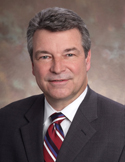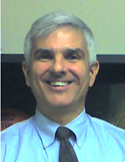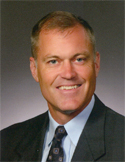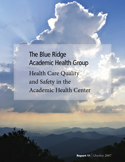
February 13, 2008 |
Realizing the potential of predictive health | |||||||
We live in an age of incredible medical breakthroughs. We know more than ever before about how and why diseases develop, and new treatments for old ills make headlines weekly. Why then is our current health care system not delivering on the promise of these advances? Despite progress in medical science and in information and communication technology, the health care system is not serving the needs of payers, providers, or--most important--the public. Our health care system is poised for a radical transformation. We stand at the brink of an achievable goal to tackle the most serious issue facing human health--the ability to predict, reduce, and even eliminate many of the specific illnesses that each of us faces. When we understand why each of us responds differently to diseases and their treatment, we can use that information to determine the right treatment at the right time for each individual based on their unique biology, behavior, and environment. That was the message of Emory’s Predictive Health Symposium, which brought together a distinguished field of national health care leaders and biomedical scientists last December. Progress in the university-wide Predictive Health Institute--a collaboration with Georgia Tech--has accelerated since the symposium: - A search is under way for an institute director, who will launch the research component of the institute and begin hiring the broad, interdisciplinary team required to implement predictive health care. - The Center for Health Discovery and Well-Being is now open on the Midtown campus. With recent IRB research protocol approval, the center will begin enrolling the first wave of 700 participants this month and collecting health information, including conventional biomarkers, research biomarkers, and some 20 surveys covering health habits, cognitive function, emotional adjustment, and other relevant factors. - A Personalized Health Unit is working to bridge conventional medicine with predictive health care research. - An undergraduate curriculum will launch this fall, and a coordinated program with the nursing school and a PhD program in collaboration with the medical school and the CDC are under way. Predictive health care has extraordinary potential to revolutionize human health--not just in theory, but in practice. We believe this innovative and exciting work has unlimited potential to transform health and healing, and I’ll continue to keep you posted on our progress. In the meantime, you can learn more about the Predictive Health Institute and view symposium presentations online. |
||||||||
|
Search for new nursing dean under way The effort to recruit a new nursing dean is well under way, following the recent resignation of Marla Salmon, effective June 2008, to become dean of nursing at the University of Washington. The search committee is co-chaired by Jim Curran, dean of the Rollins School of Public Health, and Susan Grant, chief nursing officer for Emory Hospitals and assistant dean for clinical leadership in the nursing school. Based on bids collected, the committee is in the process of choosing a search firm, with the goal of having a new dean in place by July 1. "Jim chaired the committee that brought Marla here nine years ago," says nursing professor Sandra Dunbar, "so I'd say he has a track record in this area. Combined with Susan's expertise in clinical administrative leadership, the two bring important complementary perspectives to the process. Both enjoy enormous respect and regard throughout the nursing school. This a time to seek visionary leadership to advance the school's momentum." For a summary of Salmon's accomplishments during her tenure at Emory, see press release. |
|||||||
|
|
This is the first in a series of profiles of those who lead major areas of support service throughout the Woodruff Health Sciences Center. When snow started falling one day last month, a team of professionals in Emory Hospitals worked behind the scenes to make sure that sidewalks were cleared, shuttles were running, and adequate staff, from housekeepers to physicians, were on hand to stay overnight if weather dictated. The person who leads this team is David Pugh, associate administrator for Emory Hospitals. He is the one who keeps hospital buildings and grounds running smoothly, looking well tended, and operating safely, with responsibility for facilities management, public safety, safety management, and other support services. When upgrades of any of these facilities are needed, Pugh also is the man who heads the effort on the ground, whether these are requests for big-ticket clinical equipment upgrades (the hospitals’ medical engineers all report to him), renovation of patient rooms, or construction of new wings or facilities. He worked on construction/facilities development at the new Emory Johns Creek Hospital and the re-outfitting of the recently purchased Emory University Hospital Northlake. He is working with others on the extensive Emory Clinic/Hospital redevelopment project. And he worked six years ago to oversee construction of the new building for Emory Crawford Long Hospital. Pugh has long had patient/staff/visitor safety front of mind. All security operations report to him, and it’s his door that gets the knock from regulatory agencies, fire marshals, and a host of other agencies who show up unexpectedly to make sure institutions are meeting safety codes. At least once a year, twice in patient care areas, he and his team make “hazard rounds,” checking for electrical or other problems that could compromise building safety. He’s also the administrator in charge of preparedness for major emergencies that would affect the hospitals under his jurisdiction as associate administrator. Safety of buildings and grounds traditionally has been considered separate from patient safety issues per se. But Pugh sees his own work in light of the health care quality and safety initiative involving the entire health sciences center. Each department reporting to him has goals and clear metrics to assure they are addressing quality initiatives set forth by Emory Healthcare. Pugh recently completed the Leadership for Healthcare Improvement course offered by Emory Healthcare (see Learning the basics in Quality 101), and his managers are completing the program as well. “Quality and patient safety are everyone’s job,” says Pugh. "Quality and safety of our clinical operations can't be simply a bunch of policy procedures and guidelines. They have to be a part of how we do business, of our culture and values, and I see that happening every day.” Pugh has worked in Emory hospitals for 25 years, as of this August, almost half his life. He met and married his wife Denise on campus. “Emory is always new,” says Pugh, “and it’s as exciting to me today as it was on day 1.”
|
|||||||
|
|
Emory helps launch vaccine center in New Delhi The Emory Vaccine Center partnered with the International Center for Genetic Engineering and Biotechnology (ICGEB) to launch a joint vaccine center in New Delhi, India. The center will focus on vaccines for HIV, TB, hepatitis C, dengue virus, malaria, and other infectious diseases that disproportionately affect the developing world. Emory will provide funding to support scientific staff in the new center, and ICGEB will provide space and infrastructure. Both partners will contribute scientific expertise. Collaborations could eventually expand beyond New Delhi to ICGEB components in other countries. For more information see press release. The new center is a primary focus of the Emory Global Health Institute, which is featured in the February issue of Academic Medicine (see abstract). |
|||||||
|
||||||||
Emory Healthcare expands physician practice associates Clark-Holder Clinic, PA, the largest multi-specialty group practice in West Georgia, signed a letter of intent last month to join Emory Specialty Associates (ESA), LLC, a subsidiary of Emory Healthcare. Clark-Holder has facilities in LaGrange, West Point, and Newnan and employs more than 30 clinicians and 170 staff members. ESA was formed in 2006 as Emory Healthcare's outreach physician practice organization, managed by The Emory Clinic. It houses divisions of primary care and cardiology, a division for multi-specialty groups such as Clark-Holder, and hospital-based specialties such as anesthesiology, pathology, and emergency medicine. For more information, see press release. |
||||||||
|
Learning the basics in Quality 101 Emory Healthcare's Office of Quality is providing the first of what will be an ongoing series of courses aimed at teaching what one needs to know to be able to talk the talk and walk the walk in health care quality improvement. A two-day course, Leadership for Healthcare Improvement, is intended to help leaders throughout the health sciences learn the concepts and tools needed to measure, assess, and improve quality of care. Leadership's role in creating and sustaining a "fair and just culture," in which mistakes are viewed as opportunities for process improvement, is a key component of the course. Learning how to identify, collect, and then use a "run chart" to display data is one example of course content. "Data reflect the 'voice' of the process," says Hal Jones, director of quality support services. "Displaying metrics on a run chart tells the story of how the measured process is performing over time and helps us know how to respond most effectively to what that process is telling us." Thus far, the program has had standing-room-only attendance and is receiving good reviews. This course is a prelude to a coming series of more detailed, four-month courses aimed at employees responsible for leading day-to-day quality-improvement activities. "The aim of this first course is to facilitate a receptive and supportive environment among leadership to help them learn the concepts and vocabulary so they can, in turn, offer support and coaching to their employees who will undergo the more time-intensive training to follow," says Jones. Stay tuned for more information about future quality seminars. |
|||||||
|
Awards, appointments, publications, events (For a more complete list, see Honors and Awards online.) - James Clark was appointed director of the Veterans Affairs Medical Center (VAMC) last month. He joined the center in 2005 as associate director and had served as acting director since July. Clark has more than 20 years' experience at VAMCs across the country, beginning his career at the New York VAMC and serving in administrative leadership roles at centers in Saginaw, Mich., and Northport, Va., before assuming his position in the Atlanta facility. - Ray Dingledine, chair of pharmacology in the medical school, has been appointed as the school's interim executive associate dean for research. He is working closely with his predecessor in this role, David Stephens, who is now vice president for research in the Woodruff Health Sciences Center. For more information about Dingledine's research in drug discovery, see this 2006 cover story in Emory Medicine magazine. - Doug Eaton has been named chair of physiology in the medical school. Eaton has served as deputy chair of the department for more than two decades and became acting chair after the death of former chair Robert Gunn. He directs the Center for Cell and Molecular Signaling, and his research focuses on the role of cell signaling in hypertension and electrolyte disorders, renal pathology in diabetes, and the mechanism of action in general anesthetics. See web site for more details. - Emory Johns Creek Hospital won first place in the health systems category for its project, "Improving healthcare-associated infections: Methicillin-resistant Staphylococcus Aureus (MRSA)" from the Georgia Partnership for Health and Accountability. This organization gives annual awards for achievement in reducing medical errors and improving patient safety and outcomes. The hospital implemented active surveillance screening to identify and isolate patients with MRSA to decrease the risk of transmission to other patients. - The Emory Bariatric Center at Emory Crawford Long Hospital has been accredited as a level 1 bariatric surgery center by the Bariatric Surgery Center Network Accreditation Program of the American College of Surgeons (ACS). As part of the two-year accreditation process, hospitals undergo an on-site verification by experienced bariatric surgeons, who review the center's structure, process, and quality of data using the ACS Bariatric Surgery Center Network Accreditation Program Manual as a guideline in conducting the survey. To read more, see press release. - Quality is the topic of the most recent report of the Blue Ridge Academic Health Group, Health Care Quality and Safety in the Academic Health Center, now online. Emory is well represented in this group (members listed on the web site), which reports on major health care issues and recommends public policy to effect change. - Emory's campus newspaper recently profiled Dennis Choi, director of the Neuroscience, Human Nature, and Society strategic initiative and the Comprehensive Neuroscience Center in the Woodruff Health Sciences Center. Read article online. - The joint Emory-Georgia Tech Coulter Department of Biomedical Engineering celebrates its 10th anniversary on March 6 with a colloquium in Cox Hall Ballroom. See PDF for program information and a list of distinguished speakers.
|









